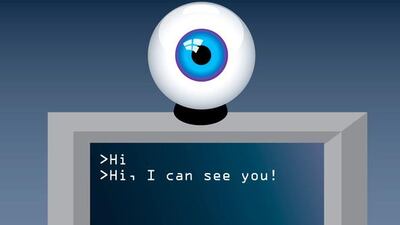Next time you’re working in a library or at a cafe or shared space – I’m assuming, of course, that you’re the kind of creative, dynamic professional that does that sort of thing – take a look at the laptops around you. If you’re among a switched-on crowd, you may notice something: many of the webcams are covered with tape.
Covering your laptop webcam is fast becoming common practice among the global professional and creative classes. And there’s a simple reason. These super-smart people are also super-paranoid. They think that someone – The Man – is watching them. In May this year, Edward Snowden blew the whistle on the US National Security Agency. He revealed the existence of vast dragnet surveillance programmes that capture a staggering amount of electronic communication.
Amid the worldwide discussion of those revelations came the news – at least, news to most of us – that intelligence agencies can remotely activate the webcam of any online laptop and use that camera to keep watch over whatever action it happens to capture. Cue the tearing of tape. The Snowden revelations aren’t even the entire picture. Facebook recently changed its privacy settings to ensure that profiles cannot be hidden from public searches. And Google recently revealed that it may start using anonymous identifiers to track our browsing.
No wonder a “Big Brother is Watching” feeling has become the defining trend of late 2013. And no wonder, too, that in this omni-surveillance world the tools that can help us protect our privacy are finding wider and more enthusiastic acceptance. An American organisation called The Guardian Project, for example, makes an app called Orbot, which allows users to send emails anonymously through mobile devices.
Or there is the secure communications service Silent Circle, which makes a range of apps designed to secure digital communications. Users can subscribe to the service, which encrypts phone calls, videos and text messages in their country of origin, ensuring that if those communications are intercepted, they cannot be read. Silent Circle says its team comprises “world-renowned cryptographers, Silicon Valley software engineers … and former US Navy SEALs and British Special Air Service security experts”. They’re pretty serious, then.
Meanwhile, in some countries the anti-surveillance movement is not just in the hands of private enterprise. In October Deutsche Telecom, Germany’s biggest telecoms company with strong ties to the German government, mooted building a walled-off “German internet” to protect German citizens from NSA interception. Will widespread concern (can it really be called paranoia if it is justified?) continue to mount, so that every webcam will soon sport its own, retractable patch? Or will it become just another memory of 2013, alongside Miley Cyrus twerking at the VMAs? There’s no telling.
But whatever happens, from now on we know that somewhere out there, shadowy forces may be watching us – through our laptops, our smartphones and, soon, our smart glasses – and recording our every movement.
But of course, if you’ve got nothing to hide, you have nothing to worry about. Right?
David Mattin is the lead strategist at trendwatching.com
• For more trends, go to www.thenational.ae/trends

